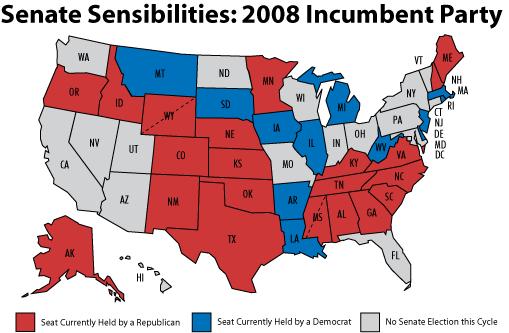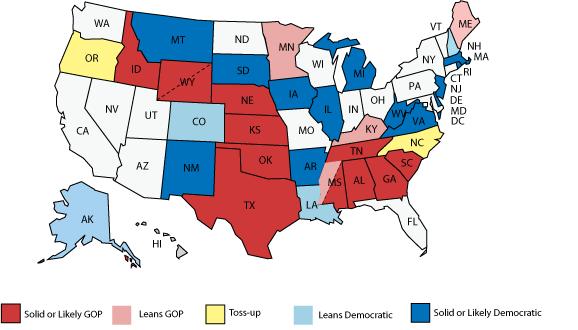Senate Sensibilities - The October 2008 Update
A Commentary by Larry J. Sabato
There are a few changes to report in the nation's Senate races since we last reviewed them in July-almost all of them in favor of the Democratic candidates. Yet the fundamental outlook hasn't changed terribly much. The Democrats will pick up a fair number of seats to pad their slim 51-to-49 margin. They are defending a mere 12 seats, and all their incumbents are running again. The Republicans have drawn the short straw, trying to protect 23 seats with five incumbents retiring in a tough political environment for the GOP.
Democrats are on target to add a minimum of four seats. They may gain as many as seven or eight. Unlike some other prognosticators, however, we still believe the Democrats are unlikely to gain the nine seats required to hit the magic number of 60 needed to shut down filibusters. Actually, Democrats need an additional ten seats to get to 60. Does anyone really count Sen. Joseph Lieberman (I-CT) as a reliable party vote on much of anything, especially in national security matters and foreign policy?
As we noted in our earlier analyses, the Senate has changed party control six times: in 1980 (D to R), 1986 (R to D), 1994 (D to R), 2001 (R to D), 2002 (D to R), and 2006 (R to D). This is no longer a rare event. Still, 2008 is now certainly not going to generate a seventh shift. Let's go to the states and see why.
The following map shows the current party control of each state with a Senate election in 2008. Thirty-three regular scheduled contests will take place in 2008, along with two special elections in Mississippi and Wyoming.
As usual, there are many contests that are not competitive. Of the 35 Senate seats on the ballot, the winning party for 23 of them seems set, 11 of them Democrat and 12 of them Republican.
|
CURRENTLY HELD BY DEMOCRATS |
||
|
State |
Incumbent |
Likely Result |
|
Arkansas |
Sen. Mark Pryor |
Democratic |
|
Delaware |
Sen. Joe Biden |
Democratic |
|
Illinois |
Sen. Dick Durbin |
Democratic |
|
Iowa |
Sen. Tom Harkin |
Democratic |
|
Massachusetts |
Sen. John Kerry |
Democratic |
|
Michigan |
Sen. Carl Levin |
Democratic |
|
Montana |
Sen. Max Baucus |
Democratic |
|
New Jersey |
Sen. Frank Lautenberg |
Democratic |
|
Rhode Island |
Sen. Jack Reed |
Democratic |
|
South Dakota |
Sen. Tim Johnson |
Democratic |
|
West Virginia |
Sen. Jay Rockefeller |
Democratic |
|
CURRENTLY HELD BY REPUBLICANS |
||
|
State |
Incumbent |
Likely Result |
|
Alabama |
Sen. Jeff Sessions |
Republican |
|
Georgia |
Sen. Saxby Chambliss |
Republican |
|
Idaho |
OPEN (Sen. Larry Craig retiring) |
Republican |
|
Kansas |
Sen. Pat Roberts |
Republican |
|
Kentucky |
Sen. Mitch McConnell |
Republican |
|
Nebraska |
OPEN (Sen. Chuck Hagel retiring) |
Republican |
|
Mississippi |
Sen. Thad Cochran |
Republican |
|
Oklahoma |
Sen. Jim Inhofe |
Republican |
|
South Carolina |
Sen. Lindsey Graham |
Republican |
|
Tennessee |
Sen. Lamar Alexander |
Republican |
|
Texas |
Sen. John Cornyn |
Republican |
|
Wyoming |
Sen. Mike Enzi |
Republican |
|
Wyoming (sp.) |
Sen. John Barrasso (appointed) |
Republican |
Of these 24, 13 are Democratic and 11 are Republican. No doubt, two or three of these contests may become more competitive than expected as new events unfold in the summer and the general election. For example, in Texas, early polls have shown Sen. John Cornyn to be weak, though Texas' statewide Republican majority still appears intact.
Now let's take a look at the same map of the 2008 Senate races, but this time with the states colored according to their current Crystal Ball outlook. The two states with a double-header (Mississippi and Wyoming) are divided by a broken line, while an asterisk indicates a turnover given the current outlook, with a seat moving from one party to the other.
It is the ten hottest Senate elections that will determine the final tally in 2008. Here is brief run-down of each, with a tentative winner indicated, where possible.
-
Alaska : Who could have believed that a Republican incumbent would be in trouble here? But the longest-serving Senate Republican, Ted Stevens, is mired in a major corporate scandal involving pay-offs and bribery. He has been indicted and is facing trial. Stevens has a tough Democratic opponent in Anchorage Mayor Mark Begich, the son of the former Democratic congressman Nick Begich, who died in a plane crash in October 1972 with then-House Majority Leader Hale Boggs (D-LA). (The wreckage was never found.) Stevens' power and seniority cannot be overestimated, but if the election were held today, Begich would defeat Stevens. In fact, a rout of Stevens was likely--until Hurricane Sarah was tapped by John McCain to be his VP. Palin and Stevens are hardly close. Palin is the reform-minded governor of Alaska, while Ted Stevens is pretty much what she ran against in her career. Will she eventually endorse Stevens, something she has so far refused to do? If so, how strongly? And will Stevens's trial conclude before Election Day? He wants that, but prosecutors may not. Should he be vindicated in court, Stevens might squeak to victory now that the McCain-Palin ticket is leading in a landslide. Can an indicted, 84-year-old senator get a last hurrah? Tune in November 4th, as the Frontier State turns. NEW LEANS DEMOCRATIC See Rasmussen Reports poll.
-
Colorado : When Republican Wayne Allard announced his retirement after two terms, the assumption was that this Purple state might well lean Democratic in 2008, just as it did in 2006 when it elected a new Democratic Governor (Bill Ritter) in a landslide. Perhaps that will prove true, and most polls show the Democratic candidate, Congressman Mark Udall, out in front of the GOP candidate, former Congressman Bob Schaeffer (who had lost the GOP Senate primary in 2004 to Pete Coors, who in turn lost to now-Democratic Senator Ken Salazar. Still, this one is competitive, and Mark Udall is not the sure thing cousin Tom Udall appears to be in New Mexico. LEANS DEMOCRATIC SLIGHTLY (PICK-UP). See Rasmussen Reports poll.
-
Kentucky : As we have said since last December, one or more seemingly 'safe' Senate seats may become competitive late in the game. How do we know? It almost always happens. And we have our first entry in this October category: Sen. Mitch McConnell (R-KY), the GOP minority leader in the Senate. Two recent surveys have shown his contest with multimillionaire Bruce Lunsford to be very close, tied outright or within the margin of error. McConnell is also below 50%, a dangerous zone for an incumbent. Almost no one thought this contest would be close. Just two weeks ago, I was told by a high-ranking Kentucky Democratic officeholder that Lunsford hadn't taken hold and McConnell was sure to be reelected. So what has changed? The rotten national environment for Republicans and the financial meltdown on Wall Street have boomeranged especially hard on a legislative leader like McConnell. Kentucky is a conservative state, but it has a populist streak in times like this. The other GOP senator from the Bluegrass State, Jim Bunning, has won extremely tight victories in his two previous elections. Even McConnell has rarely been overwhelmingly popular in the state. Since his first close election in 1984 against a Democratic incumbent (courtesy of the Reagan reelection landslide), he has had only one truly easy race, in 2002 when he won by close to two-to-one against weak opposition. McConnell's usual level of voter support has hovered around 55 percent.
Can Lunsford pull off the upset of the 2008 Senate cycle? It is now within the realm of possibility, though we are not yet ready to declare McConnell on his way out. To the contrary, the incumbent is a wily politician who has raised the many millions he needs to compete fully against a wealthy opponent. McConnell knows how to win tough contests, and he can slug it out with the best of them on the ground for those critical few votes that can make the difference. Finally, his old party adversary John McCain--with whom he has clashed repeatedly over campaign finance reform--will win Kentucky handily, ironically providing a few yards of coattail to McConnell.
If current polling trends hold, we'll move this to TOSS UP. For now, though, McConnell's impressive electoral record merits a rating of LEANS REPUBLICAN. See Rasmussen Reports poll.
-
Louisiana : This is the only contest involving a Democratic incumbent because, incredibly, this is the only incumbent that Republicans have any reasonable shot at defeating. Senator Mary Landrieu has won two close contests for Senate, and with the exodus of Democratic African-American votes from New Orleans to other states after Hurricane Katrina, she can take nothing for granted. On the other hand, she has a dozen years of invaluable seniority, and has done a creditable job in steering relief to her Katrina-stricken state. Bayou State voters may not want to give up their one senator in the majority party caucus. Landrieu's GOP opponent is state Treasurer John Kennedy, a party-switcher. This might be a tight race in the end, but it doesn't seem so at the moment. Despite solid fundraising by Kennedy, Landrieu has a clear edge. Governor Bobby Jindal (R) is an asset for Kennedy, and the national Republican Party, having no other real targets, is pouring resources into this race. On the other hand, scandal-drenched Senator David Vitter (R), enmeshed in a prostitution ring, may make Louisianans think twice about electing a second Republican. (One postscript: A court decision has required the state to hold regular party primaries in 2008 instead of the unique all-party primary that has characterized Bayou State politics for decades.) We remember that Landrieu won her first two contests narrowly, but now this one clearly LEANS DEMOCRATIC. See Rasmussen Reports poll.
-
Maine : Two-term Senator Susan Collins (R) is still the favorite for reelection, but if the Democratic nominee for President wins Maine by a wide margin, the coattail effect could work in favor of Congressman Tom Allen (D). Collins does not have the electoral strength of Maine's other U.S. senator, Olympia Snowe (R), so her elections are always worth monitoring. But Collins is holding up well so far. LEANS REPUBLICAN. See Rasmussen Reports poll.
-
New Hampshire : No state in the nation has moved so quickly from Republican to Democratic in party orientation. This is a state that intensely dislikes both President Bush and the Iraq War, and the feeling showed from top to bottom of the state's 2006 elections. Freshman GOP Senator John Sununu has his hands full in a re-match with former Gov. Jeanne Shaheen (D). Most major public and private polls show her ahead, some by a wide margin and others just narrowly. It is worth stressing that Sununu has been a strong closer in past elections and he is very well funded. Also, Senator John McCain is New Hampshire's kind of Republican, and the state rescued McCain's candidacy from oblivion in January. McCain's nomination was the best news Sununu could have hoped for. Most of the other presidential Republicans were sure losers in this state. Here is a contest where the incumbent senator's fate is closely tied to McCain's. Should McCain do well and generate some coattail, Sununu might survive. But this looks like Shaheen's race to win or lose, and right now she's on track to avenge her 2002 loss. LEANS DEMOCRATIC (PICK-UP) See Rasmussen Reports poll.
-
New Mexico : What started as a free-for-all is ending up as a very probable seat gain for the Democrats. The retirement of longtime Sen. Pete Domenici (R) led all three of New Mexico's U.S. House members to throw their hats in the ring--Democrat Tom Udall and Republicans Steve Pearce and Heather Wilson. The Land of Enchantment can also be the land of tight contests, but not this year. Republicans took a wrong turn in their June 3rd primary by nominating the conservative Pearce over the moderate Wilson (backed by Domenici) by a narrow 51% to 49% margin. Wilson might have been able to capitalize on her gender and more centrist record against Udall. Pearce has little but hard conservatism to sell in a year when it isn't particularly appealing here. Not surprisingly, the polls strongly favor Udall, the cousin of the Senate frontrunner in near-by Colorado. Pearce will need a miracle to win. NEW LIKELY DEMOCRATIC. See Rasmussen Reports poll.
-
North Carolina : Most observers are amazed that Senator Elizabeth Dole is in trouble at the hands of Democrat Kay Hagan, a state senator. We still have a hard time believing she will lose, but this outcome is now very much in the realm of possibility. The contest began as LIKELY REPUBLICAN, later changed to LEANS R. Now we are moving it from LEANS REPUBLICAN to TOSS UP for the first time. We are monitoring this battle on a daily basis. Most polls show Dole with a slight lead, but less than 50%--the key safety margin for incumbents, and there are whispers that Dole has slipped behind in tracking polls We have asked many Tarheel politicos to assess the reasons behind Dole's troubles. Both Democrats and Republicans cite the same explanation: Hagan is an attractive, energetic campaigner, but this may be a referendum on Dole.
Dole is perceived (fairly or unfairly) as being Washington-based, as having 'lost touch' with the state she represents. Perhaps this is a canard invented by Democrats--but it has stuck in some quarters. Recently released figures suggesting Dole spent a mere thirty-three days in North Carolina for all of 2005 and 2006 (two years combined) only underline the Democrats' charge. In the end, perhaps Dole will be assisted by John McCain's somewhat probable victory in North Carolina, though McCain will claim the state's 15 electoral votes by far less than the usual GOP margin. Another factor here is the gubernatorial match-up, in which the once heavily favored Democrat Beverley Perdue, the current lieutenant governor, is on the verge of losing to Charlotte Mayor Pat McCrory. It will be a shocker if she does, but Democrats have controlled the statehouse for 16 years consecutively, and it may take time for a--dare we use the word--change. If McCain and McCrory both win, Dole ought to be assisted, though maybe contrarian Tarheel voters will decide to oust the incumbent party from both top posts. NEW TOSS-UP. See Rasmussen Reports poll. -
Minnesota : Here's a state that still leans Democratic but overall can be unpredictable politically. Six years ago, Republican Norm Coleman won a narrow victory over former Vice President Walter Mondale (D), the substitute nominee after the tragic death of Senator Paul Wellstone (D) in a plane crash. Coleman is beatable in 2008, but it seems questionable whether satirist Al Franken can do it. Franken has had problem after problem. He was found to have had a substantial number of overdue tax bills in various states; some of his off-color satires from past years have not sold well in this more politically correct era; and some videotaped Franken tirades, laced with obscenities, have turned up in Coleman's advertising. Also assisting Coleman is the independent candidacy of Dean Barkley, appointed to the Senate for a few weeks by voluble Independent Gov. Jesse Ventura in 2002. Thanks to Barkley, Coleman can win with a plurality of less than 50% in a state that Barack Obama will carry by a wide margin. Had Democrats nominated one of their members of the U.S. House, they might have picked up this seat. But they didn't, and Coleman continues to work this state hard, and absent a massive Obama sweep, this one LEANS REPUBLICAN. See Rasmussen Reports poll.
-
Mississippi (special): The seat of resigned Sen. Trent Lott went to Congressman Roger Wicker (R), courtesy of GOP Governor Haley Barbour. Relatively little-known and running in a lukewarm year for the GOP even in the Magnolia State, Wicker started out behind his Democratic challenger, former Governor Ronnie Musgrove (D), who lost his office to Barbour in 2003. Usually, a defeat for reelection as Governor casts doubt on a comeback, and Musgrove had an embarrassingly public divorce while he was Governor, complete with allegations of adultery. Moreover, Barack Obama is no longer competitive in this 38% black state. John McCain's sizeable victory here, combined with Wicker's quasi-incumbency, will probably give him the seat for the next four years. (Lott's term was due to expire in 2012.) Recently, Gov. Barbour tried to assist Wicker further by listing the Senate special election at the bottom of the ballot, where many less educated voters would presumably miss it. A nearly unanimous state Supreme Court nixed this underhanded trick. Both Senate contests will be listed together. Wicker should not want to win that way, and he likely doesn't need it. NEW-LEANS REPUBLICAN. See Rasmussen Reports poll.
-
Oregon : This contest has turned into an exceptionally close one. Senator Gordon Smith (R) has managed to forge a successful political career in an unfriendly, Democratic environment. But he must always be careful to project a moderate image in order to win the swing independents that, when added to the GOP base, can produce victory in November. He has done so on issues ranging from Iraq to the environment, but will it be enough in 2008? As usual, the Democratic nominee for President will be the favorite to carry Oregon, creating a headwind for Smith. Obama is actually faring much better than Al Gore and John Kerry in this Pacific Coast state. Smith's Democratic opponent, state House Speaker Jeff Merkley, who defeated attorney Steve Novick in a competitive May primary, is aggressively tying Smith to George W. Bush, whose popularity in Oregon is very low. At first we gave the edge to the incumbent, but this has turned into a nip-and-tuck battle. NEW TOSS-UP. See Rasmussen Reports poll.
-
Virginia : The Old Dominion hasn't moved nearly as far as New Hampshire across the political spectrum, but it has undeniably become more Democratic in recent years, primarily because of the growth of moderate Northern Virginia. The GOP has lost races for Governor in 2001 and 2005, U.S. Senator in 2006, and the state Senate in 2007. The man who started the movement to the Democrats, former governor Mark Warner, is headed to the Senate in 2008. On May 31 Republicans nominated Warner's controversial predecessor, former Governor Jim Gilmore, who has little money or remaining appeal. Gilmore's already severe problems were compounded by what happened at the convention. He barely squeaked by a gadfly state legislator, Del. Bob Marshall with a mere 50.3% of the votes cast. The Virginia GOP has moved farther right at a time when the state as a whole has dramatically moderated, making the Republican party's brand unpalatable to key swing centrists and independents who fund the candidates. All this is great news for the Democrats. Mark Warner will succeed the retiring John Warner (R) in a landslide for the Democrats. Democrats will control the Governorship and both Senate seats for the first time since January 1970. Virginia's years as a Republican stronghold are well over. Democrats hope that Warner's likely 60%-plus showing will provide the votes needed for Barack Obama to become the first Democrat to carry Virginia in a presidential election since LBJ in 1964. CERTAIN DEMOCRATIC (PICK-UP). See Rasmussen Reports poll.
Therefore, the early outlook is for another very good year for the Democrats. The Crystal Ball has Democrats in line for pick-ups in Virginia, New Mexico, Colorado, and Alaska, in that order of likelihood. Oregon, Kentucky, and North Carolina comprise the second tier of possible Democratic gains, with Oregon and North Carolina's GOP incumbents already involved in toss-up races. The third tier states, Maine and Minnesota, are both quite a stretch for Democrats, though not impossible, with Minnesota more likely than Maine to fall from GOP hands.
In sum, the Democrats are on track to win somewhere between four and eight additional Senate seats. While we will predict every contest by November 4--and call all toss-ups definitively--our estimate in early October is that Democrats most probably will capture a total of six seats, bringing them to 57 of 100 (counting Joe Lieberman at the moment.) That is a more than respectable haul for one election night--but it is a few seats from the sixty reliable votes needed to tame the chaotic Senate.
Larry J. Sabato is the director of the Center for Politics at the University of Virginia.
See Other Commentary by Larry Sabato
See Other Political Commentary
Views expressed in this column are those of the author, not those of Rasmussen Reports.
Rasmussen Reports is a media company specializing in the collection, publication and distribution of public opinion information.
We conduct public opinion polls on a variety of topics to inform our audience on events in the news and other topics of interest. To ensure editorial control and independence, we pay for the polls ourselves and generate revenue through the sale of subscriptions, sponsorships, and advertising. Nightly polling on politics, business and lifestyle topics provides the content to update the Rasmussen Reports web site many times each day. If it's in the news, it's in our polls. Additionally, the data drives a daily update newsletter and various media outlets across the country.
Some information, including the Rasmussen Reports daily Presidential Tracking Poll and commentaries are available for free to the general public. Subscriptions are available for $4.95 a month or 34.95 a year that provide subscribers with exclusive access to more than 20 stories per week on upcoming elections, consumer confidence, and issues that affect us all. For those who are really into the numbers, Platinum Members can review demographic crosstabs and a full history of our data.
To learn more about our methodology, click here.





